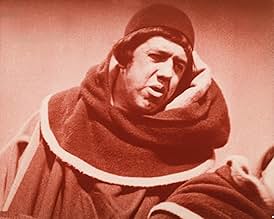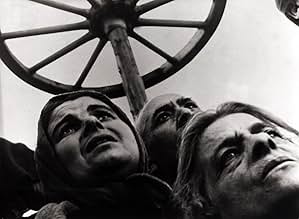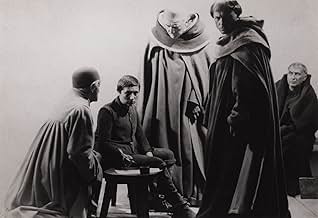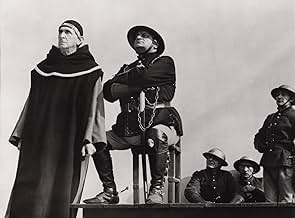CALIFICACIÓN DE IMDb
8.1/10
66 k
TU CALIFICACIÓN
La joven francesa Juana de Arco, salvadora de la patria frente a los ingleses, y que declara sentirse inspirada directamente por Dios, se enfrenta a su procesamiento y a una posible condena ... Leer todoLa joven francesa Juana de Arco, salvadora de la patria frente a los ingleses, y que declara sentirse inspirada directamente por Dios, se enfrenta a su procesamiento y a una posible condena a muerte.La joven francesa Juana de Arco, salvadora de la patria frente a los ingleses, y que declara sentirse inspirada directamente por Dios, se enfrenta a su procesamiento y a una posible condena a muerte.
- Dirección
- Guionistas
- Elenco
- Premios
- 4 premios ganados y 1 nominación en total
Maria Falconetti
- Jeanne d'Arc
- (as Mlle Renée Falconetti)
Eugene Silvain
- Évêque Pierre Cauchon (Bishop Pierre Cauchon)
- (as Eugène Silvain)
Louis Ravet
- Jean Beaupère
- (as Ravet)
Armand Lurville
- Juge (Judge)
- (as André Lurville)
Jean Aymé
- Juge (Judge)
- (sin créditos)
Camille Bardou
- Richard Beauchamp, 13th Earl of Warwick
- (sin créditos)
Gilbert Dacheux
- Juge (Judge)
- (sin créditos)
Gilbert Dalleu
- Jean Lemaître
- (sin créditos)
Paul Delauzac
- Martin Ladvenu
- (sin créditos)
Dimitri Dimitriev
- Juge (Judge)
- (sin créditos)
- Dirección
- Guionistas
- Todo el elenco y el equipo
- Producción, taquilla y más en IMDbPro
Resumen
Reviewers say 'The Passion of Joan of Arc' is celebrated for its innovative close-ups, emotional intensity, and pioneering silent film techniques. Renée Falconetti's performance is lauded for its subtlety and expressiveness. The film delves into themes of faith, power, and human spirit, contrasting Joan's purity with her accusers' corruption. Critics praise Dreyer's meticulous direction and the film's historical significance. Some find the silent format and close-ups challenging, yet it remains a landmark in cinematic achievement.
Opiniones destacadas
This film almost leads one to believe that sound betrays the emotion the eyes capture. Just as the blind develop hearing far better than the average, the deaf develop a keen sense of sight. I am convinced that a lack of dialogue forces us to read the language of the face and body, a verbage unmatched in beauty and nuance. Though the accompanying musical piece (be careful not to identify it as a score), so deliciously inspired by the film, enhances the visual playground; it is the actors' faces that comprise this tour de force. Ms. Falconetti shifts from worry and doubt to unabashed conviction in a single shot, giving the viewer the luck of seeing one's thoughts in progress. She needs no response to the interrogation, it's all in her face. Renee is not superficially beautiful and the lack of make-up only reinforces how bare Joan is, but it is the uncanny ability of an incomparable stage actor to be a window into the soul that makes her so stunning, for the soul we see is one we only wish to attain for ourselves. The Church sees what we see, and they respond just as clearly to her unspoken protest with vehement pomp. The cinematography is so astounding for its time no comment could ever do it justice. Though many comments can be made, and are, surrounding the inspiration and detail for the set, it is at its core an incredible gift from Dreyer to the actors meant to inspire. It plays little part in the film, but to pull an inconceivable last drop of reality from the actors. A testament I can imagine will never be matched to the incredible power of silence.
What can one say about this work of art that has not been said many times before by those far better qualified to explain both it's importance and place as cinema and art? I shall not comment on the greatness of the film's technical achievements; the stunning cinematography, the production design, the brilliance of the screenplay based on actual transcripts from the trial, or the perfection of Mr. Dreyer's direction. The performance of Falconetti as Jeanne d' Arc has a profundity and depth far beyond my ability to illuminate. I suppose the best I can hope to do is to share my feelings, however inadequately expressed, of the effect it had on me. To say that it may be the greatest film ever made is to sound both obvious and trite. That a work of such beauty and simplicity, made seventy-six years ago can still have the power to move audiences in an era of multi-million dollar, hi-tech, bombastic over-wrought cinematic drivel is in itself a testament to the vision and genius of Carl Theodor Dreyer, Maria Falconetti and their collaborators. It is nourishment for those that hunger for something more in cinema, a feast for the soul. It is a reminder that film can indeed be art, and this film like all great works of art, lifts and transports us from the routine of our work-a-day lives to enable us, if only for a moment to experience the sublime. When viewing it we look at it as looking in a mirror. That is to say we look into ourselves. We question ourselves as to our own beliefs, or the lack thereof and the strength of spirit that enables an individual to endure the unendurable. Viewing it is a profound experience the nature of which for myself is transcendent rather than religious, because I am not in the least a religious person. Transcendent because it evokes emotions and thoughts that I cannot wholly account for, or adequately explain.
"La Passion of Jeanne d'Arc" is stark, radiant, exalted, simple, (but never simplistic), and ultimately sublime. The rest is silence.
"La Passion of Jeanne d'Arc" is stark, radiant, exalted, simple, (but never simplistic), and ultimately sublime. The rest is silence.
Carl Th. Dreyer's The Passion of Joan of Arc was made, perhaps, years ahead of its time- my guess would be that if it wasn't burned after its initial release, it would've had as stunning an impact on the film world years down the line as Citizen Kane did. Though the use of close-ups and distorted angles were not completely new in this film, it felt like Dreyer was creating a new kind of cinema, one where reality, however cold and pitiful, was displayed with complete sincerity. There is also the editing (by Dreyer and Marguerite Beague), which has the timing that many directors/editors of the modern day could only hope to achieve (it has the influence of Eisenstein, only in a totally different historical context), and those moves with the camera by Rudolph Mate (who would go on to photograph Foreign Correspondent and Lady from Shanghai) that are precious- to call his work on the film extraordinary is an understatement.
And it was crucial for Dreyer to use the close-ups and tilted angles and shots where you only see the eyes in the bottom of the frame, and so forth- he's developing the perfect atmosphere in regards to a trial set in 15th century France. It's all those eyes, all those faces, holding all those stolid mindsets that send Joan to her fate. Pretty soon a viewer feels these presences from all these people, so strong and uncompromising, and Dreyer does a miraculous thing- he makes it so that we forget about the time and place, and all of our attention is thrown onto those eyes of Joan, loaded to brim with a sorrow for where she is, but an un-questionable faith in what she feels about God. I wondered at one point whether Dreyer was making as much a point on people's faiths and prejudices in the almighty, or just one on basic humanity.
There have been many before me who have praised Falconetti's performance to the heavens (Kael called it the finest performance in film), but in a way it almost can't be praised enough. What she achieves here is what Ebert must've felt watching Theron in the recent 'Monster'. I didn't even see her in a performance as Joan of Arc- I saw her as being the embodiment of it, as if Falconetti (with Dreyer's guidance) took Joan out of the pages of the trial transcript and her entire soul took over. There is something in an actor that has to be so compelling, so startling, and indeed so recognizable, that a person can feel empathy and/or sympathy for the person the actor's playing. All a viewer has to do is stare into Falconetti's eyes in any shot, close-up or not, and that viewer may get stirred to boiled-down emotion.
For me, it was almost TOO over-whelming an emotional experience- when Joan is about to get tortured, for example, I found myself completely lost from where I was watching the film, everything in my soul and being was with Joan in that chamber, and for a minute I broke out in tears. That's the kind of effect that Dreyer's craft and all the acting work (including Eugene Sylvain as the Bishop Cauchon, and of course Artaud as Jean) can have on a viewer. I'm not saying it has to, yet The Passion of Joan of Arc could- and should- be considered a milestone in cinematic tragedy, where the images that come streaming forth never leave a viewer, and the detail for time and place becomes just that, a detail for the main stage. Love Joan or hate her, this is for keeps.
And it was crucial for Dreyer to use the close-ups and tilted angles and shots where you only see the eyes in the bottom of the frame, and so forth- he's developing the perfect atmosphere in regards to a trial set in 15th century France. It's all those eyes, all those faces, holding all those stolid mindsets that send Joan to her fate. Pretty soon a viewer feels these presences from all these people, so strong and uncompromising, and Dreyer does a miraculous thing- he makes it so that we forget about the time and place, and all of our attention is thrown onto those eyes of Joan, loaded to brim with a sorrow for where she is, but an un-questionable faith in what she feels about God. I wondered at one point whether Dreyer was making as much a point on people's faiths and prejudices in the almighty, or just one on basic humanity.
There have been many before me who have praised Falconetti's performance to the heavens (Kael called it the finest performance in film), but in a way it almost can't be praised enough. What she achieves here is what Ebert must've felt watching Theron in the recent 'Monster'. I didn't even see her in a performance as Joan of Arc- I saw her as being the embodiment of it, as if Falconetti (with Dreyer's guidance) took Joan out of the pages of the trial transcript and her entire soul took over. There is something in an actor that has to be so compelling, so startling, and indeed so recognizable, that a person can feel empathy and/or sympathy for the person the actor's playing. All a viewer has to do is stare into Falconetti's eyes in any shot, close-up or not, and that viewer may get stirred to boiled-down emotion.
For me, it was almost TOO over-whelming an emotional experience- when Joan is about to get tortured, for example, I found myself completely lost from where I was watching the film, everything in my soul and being was with Joan in that chamber, and for a minute I broke out in tears. That's the kind of effect that Dreyer's craft and all the acting work (including Eugene Sylvain as the Bishop Cauchon, and of course Artaud as Jean) can have on a viewer. I'm not saying it has to, yet The Passion of Joan of Arc could- and should- be considered a milestone in cinematic tragedy, where the images that come streaming forth never leave a viewer, and the detail for time and place becomes just that, a detail for the main stage. Love Joan or hate her, this is for keeps.
If you'll pardon the rambling, here are my thoughts immediately after watching this on DVD an hour ago.......
THE STORY - Many of the times, while watching this for the first time, I thought this was almost the re-enactment of Jesus' last day, seeing the phony trial, the trumped-up charges He endured by legalistic, power-hungry religious leaders of the day who had no clue who God is, and then the tragic end to the central character. Apparently, there were a lot of similarities to Joan of Arc's last day and of Christ's day. However, here it's the Catholic leaders who are the 'bad guys' while in Jesus' time it was the Pharisees and the Sanhedrin. Also, with Joan's story here, she is portrayed far differently in her ordeal than Christ did, the latter taking everything in stride stoically while Joan, without any physical beating, still cried constantly and signed some paper in a moment of weakness (although she later recants that, which costs the woman her life.)
Anyway, about this film:
THE GOOD - Wow, what incredible direction and photography. Scene after scene is pretty amazing and especially so when you consider this was made about 80 years ago! I would like to see the same director and photographer doing work with today's technology.
The expressions on Maria Falconetti's face throughout the film are memorable. A sadder, more pained look on Joan of Arc - or anyone else's - I have not seen in a motion picture. She also must have set a record that still stands for the most tears shed by one person in a movie! The woman's eyes were like faucets.
All of the faces in here - and the film is mostly a series of facial closeups - are amazing and kudos to Criterion for making a DVD that showed these faces with a clear picture and amazing detail. Director Carl Theodor Dreyer's camera angles still look innovative today. He and Orson Welles seem to share the same love of this kind of photography. I found myself numerous times just shaking my head in admiration for how these characters were photographed.
Another big plus for this film was the addition of "The Voices of Light." They made the music score in here fantastic. I can't recall too many films in which I have been so impressed with a soundtrack. The DVD gives you the option of watching this film with or without that audio. I strongly recommend viewers to take the audio.
Finally, the story itself is memorable, with a powerful ending.
THE BAD - I have to make these comments to be fair and honest. It's not hard to understand why many people will find this film almost impossible to sit through, especially those with no emotional or spiritual involvement with the story. That is because it is extremely slow and repetitive. Shot-after-shot of just Falconetti agonizing or crying and weird-looking men staring at her. If you aren't a devotee of cinematography, this movie could be extremely boring after about 10 minutes.
As powerful as the story is, it isn't a movie I would recommend for most people. I think most folks - of any age, frankly - would be turned off after 20 minutes. I understand that. As mentioned, this is not an easy film to view. This might be the longest 80-minute movie you'll ever see, if you aren't into it.
OVERALL - Visually and audibly: an astounding movie and one I am glad to have finally watched. If I was wishing to get into the movie business and wanted to learn how to shoot films, this would be a film I would study numerous times. Otherwise, one viewing is plenty. I can only recommend this film to a very select audience.
THE STORY - Many of the times, while watching this for the first time, I thought this was almost the re-enactment of Jesus' last day, seeing the phony trial, the trumped-up charges He endured by legalistic, power-hungry religious leaders of the day who had no clue who God is, and then the tragic end to the central character. Apparently, there were a lot of similarities to Joan of Arc's last day and of Christ's day. However, here it's the Catholic leaders who are the 'bad guys' while in Jesus' time it was the Pharisees and the Sanhedrin. Also, with Joan's story here, she is portrayed far differently in her ordeal than Christ did, the latter taking everything in stride stoically while Joan, without any physical beating, still cried constantly and signed some paper in a moment of weakness (although she later recants that, which costs the woman her life.)
Anyway, about this film:
THE GOOD - Wow, what incredible direction and photography. Scene after scene is pretty amazing and especially so when you consider this was made about 80 years ago! I would like to see the same director and photographer doing work with today's technology.
The expressions on Maria Falconetti's face throughout the film are memorable. A sadder, more pained look on Joan of Arc - or anyone else's - I have not seen in a motion picture. She also must have set a record that still stands for the most tears shed by one person in a movie! The woman's eyes were like faucets.
All of the faces in here - and the film is mostly a series of facial closeups - are amazing and kudos to Criterion for making a DVD that showed these faces with a clear picture and amazing detail. Director Carl Theodor Dreyer's camera angles still look innovative today. He and Orson Welles seem to share the same love of this kind of photography. I found myself numerous times just shaking my head in admiration for how these characters were photographed.
Another big plus for this film was the addition of "The Voices of Light." They made the music score in here fantastic. I can't recall too many films in which I have been so impressed with a soundtrack. The DVD gives you the option of watching this film with or without that audio. I strongly recommend viewers to take the audio.
Finally, the story itself is memorable, with a powerful ending.
THE BAD - I have to make these comments to be fair and honest. It's not hard to understand why many people will find this film almost impossible to sit through, especially those with no emotional or spiritual involvement with the story. That is because it is extremely slow and repetitive. Shot-after-shot of just Falconetti agonizing or crying and weird-looking men staring at her. If you aren't a devotee of cinematography, this movie could be extremely boring after about 10 minutes.
As powerful as the story is, it isn't a movie I would recommend for most people. I think most folks - of any age, frankly - would be turned off after 20 minutes. I understand that. As mentioned, this is not an easy film to view. This might be the longest 80-minute movie you'll ever see, if you aren't into it.
OVERALL - Visually and audibly: an astounding movie and one I am glad to have finally watched. If I was wishing to get into the movie business and wanted to learn how to shoot films, this would be a film I would study numerous times. Otherwise, one viewing is plenty. I can only recommend this film to a very select audience.
10zeph-3
I saw this film for the very first time last week and was so tremendously captivated by it that I needed to share this rapture. The innovative camera-angles, the close-ups revealing pain and spirituality. It elevates the human condition and the Art of film. I would love to be able to go on into the whys or hows or technicalities. But my words couldn't do the film justice for the imagery still overwhelms me.
¿Sabías que…?
- TriviaAfter completing the original cut of the film, director Carl Theodor Dreyer learned that the entire master print had been destroyed accidentally. With no ability to reshoot, Dreyer re-edited the entire film from footage he had originally rejected.
- ErroresIn the 15th century, a priest can be seen wearing a Jesuit robe. The Jesuit order was founded in the 16th century.
- Citas
Jeanne d'Arc: Dear God, I accept my death gladly but do not let me suffer too long. Will I be with You tonight in Paradise?
- Versiones alternativasIn the 1930s, a one-hour synchronized sound version was reissued under the name "The Immortal Saint" using David Ross as a narrator to replace intertitles.
- ConexionesEdited into From Camille to Joan of Arc (1961)
Selecciones populares
Inicia sesión para calificar y agrega a la lista de videos para obtener recomendaciones personalizadas
- How long is The Passion of Joan of Arc?Con tecnología de Alexa
Detalles
- Fecha de lanzamiento
- País de origen
- Idiomas
- También se conoce como
- The Passion of Joan of Arc
- Locaciones de filmación
- Productora
- Ver más créditos de la compañía en IMDbPro
Taquilla
- Total en EE. UU. y Canadá
- USD 21,877
- Fin de semana de estreno en EE. UU. y Canadá
- USD 6,408
- 26 nov 2017
- Total a nivel mundial
- USD 22,731
- Tiempo de ejecución
- 1h 50min(110 min)
- Color
- Mezcla de sonido
- Relación de aspecto
- 1.33 : 1
Contribuir a esta página
Sugiere una edición o agrega el contenido que falta






























